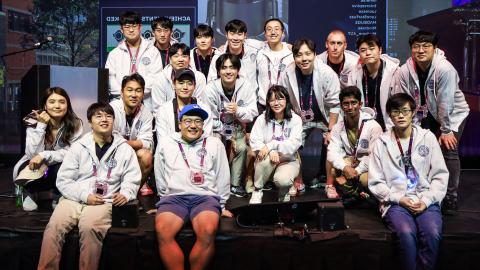A group of Georgia Tech students and alumni were named finalists at the DARPA AI Cyber Challenge (AIxCC) semi-final competition held at DEF CON 32 in Las Vegas.
Team Atlanta, which included the Georgia Tech experts, will now compete against six other teams in the final round that takes place at DEF CON 33 in August 2025. The finalists will keep their AI system and improve it over the next 12 months using the $2 million semi-final prize.
For three days, a cybercriminal unleashed a crippling ransomware attack on the futuristic city of Northbridge. The attack shut down the city’s infrastructure and severely impacted public services, until Georgia Tech cybersecurity experts stepped in to stop it.
This scenario played out this weekend at the DARPA AI Cyber Challenge (AIxCC) semi-final competition held at DEF CON 32 in Las Vegas. Team Atlanta, which included the Georgia Tech experts, were among the contest’s winners.
Team Atlanta will now compete against six other teams in the final round that takes place at DEF CON 33 in August 2025. The finalists will keep their AI system and improve it over the next 12 months using the $2 million semi-final prize.
The AI systems in the finals must be open sourced and ready for immediate, real-world launch. The AIxCC final competition will award a $4 million grand prize to the ultimate champion.
Team Atlanta is made up of past and present Georgia Tech students and was put together with the help of SCP Professor Taesoo Kim. Not only did the team secure a spot in the final competition, they found a zero-day vulnerability in the contest.
“I am incredibly proud to announce that Team Atlanta has qualified for the finals in the DARPA AIxCC competition,” said Taesoo Kim, professor in the School of Cybersecurity and Privacy and a vice president of Samsung Research.
“This achievement is the result of exceptional collaboration across various organizations, including the Georgia Tech Research Institute (GTRI), industry partners like Samsung, and international academic institutions such as KAIST and POSTECH.”
After noticing discrepancies in the competition score board, the team discovered and reported a bug in the competition itself. The type of vulnerability they discovered is known as a zero-day vulnerability, because vendors have zero days to fix the issue.
While this didn’t earn Team Atlanta additional points, the competition organizer acknowledged the team and their finding during the closing ceremony.
“Our team, deeply rooted in Atlanta and largely composed of Georgia Tech alumni, embodies the innovative spirit and community values that define our city,” said Kim.
“With over 30 dedicated students and researchers, we have demonstrated the power of cross-disciplinary teamwork in the semi-final event. As we advance to the finals, we are committed to pushing the boundaries of cybersecurity and artificial intelligence, and I firmly believe the resulting systems from this competition will transform the security landscape in the coming year!”
The team tested their cyber reasoning system (CRS), dubbed Atlantis, on software used for data management, website support, healthcare systems, supply chains, electrical grids, transportation, and other critical infrastructures.
Atlantis is a next-generation, bug-finding and fixing system that can hunt bugs in multiple coding languages. The system immediately issues accurate software patches without any human intervention.
AIxCC is a Pentagon-backed initiative that was announced in August 2023 and will award up to $20 million in prize money throughout the competition. Team Atlanta was among the 42 teams that qualified for the semi-final competition earlier this year.
